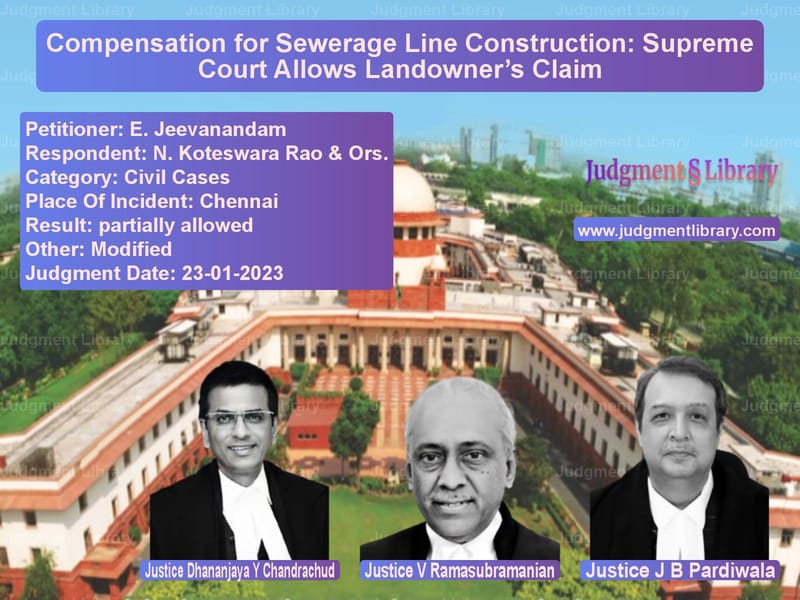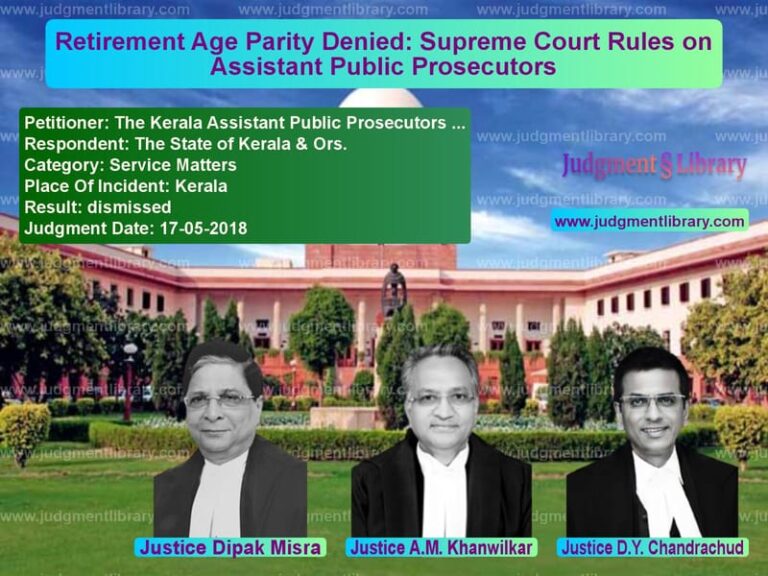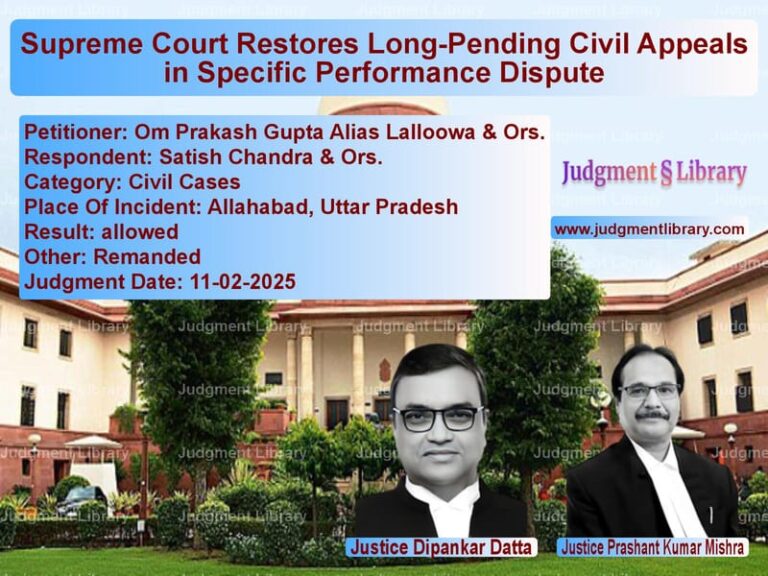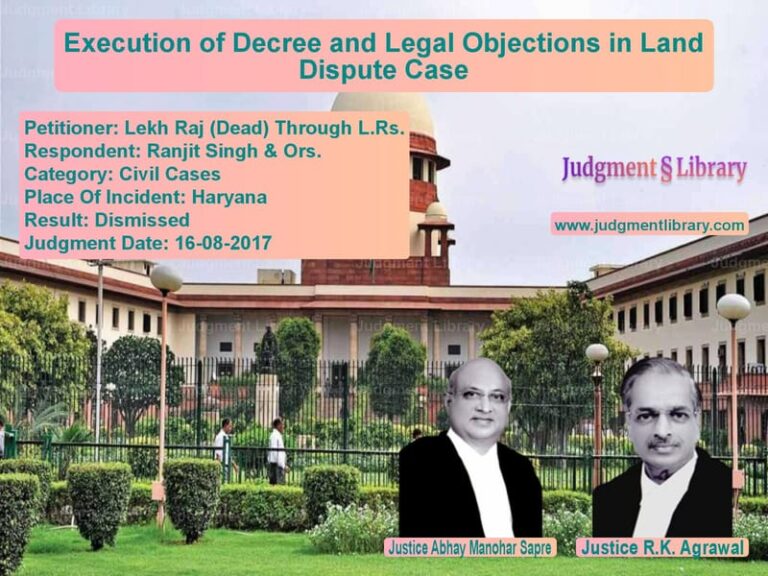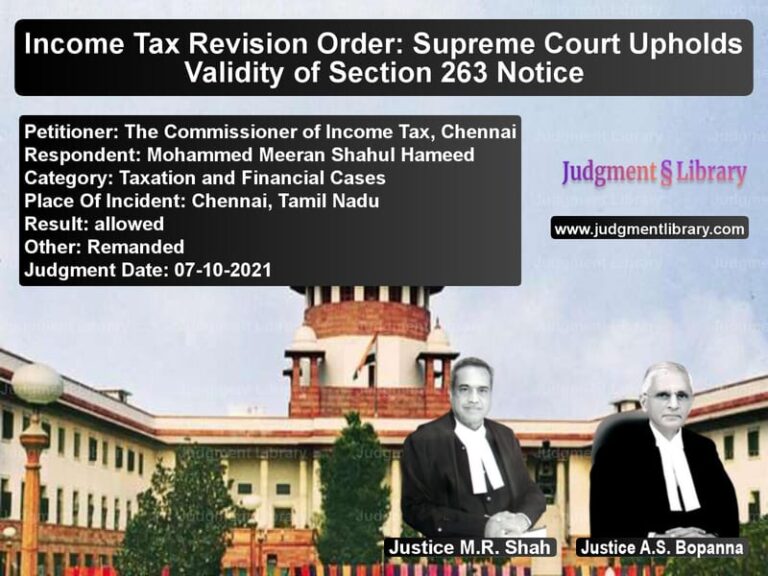Compensation for Sewerage Line Construction: Supreme Court Allows Landowner’s Claim
The case of E. Jeevanandam v. N. Koteswara Rao & Ors. revolves around a dispute concerning the laying of a sewerage line over a privately owned piece of land. The Supreme Court examined whether the petitioner, who claimed ownership of the land, was entitled to compensation after the authorities had completed the construction of the sewerage system. The case also delved into issues of due process and the rights of landowners in infrastructure projects.
Background of the Case
The petitioner, E. Jeevanandam, served as the Chairperson of the erstwhile Maduravoyal Town Panchayat. During his tenure, a resolution was passed on 28 November 2001, approving the provision of sewerage facilities in the region, including Ward No. 147 of Rukmani Nagar Road, Chennai.
In 2009, the government sanctioned Rs. 57.45 crores for the sewerage project, which commenced on 18 August 2009. The project faced objections regarding a 110-meter stretch at Rukmani Nagar Road, where the petitioner later purchased land in 2011. The petitioner claimed ownership of the land where the sewerage line was laid, leading to legal disputes.
Legal Issues Considered
The Supreme Court examined the following key legal questions:
- Whether the sewerage construction violated the petitioner’s property rights.
- Whether the petitioner was entitled to compensation for the land.
- Whether the decision to lay the sewer line over the disputed land was justified.
- Whether the petitioner was given a fair opportunity to challenge the construction.
Arguments by the Petitioner (E. Jeevanandam)
The petitioner contended that:
- The authorities unlawfully laid the sewerage line on his property without acquiring the land or providing compensation.
- The government should have considered an alternative route as suggested by him.
- The High Court’s directive to proceed with the construction without hearing his objections was a violation of natural justice.
- Since civil disputes regarding ownership were still pending, the government had no right to proceed with the project on his land.
Arguments by the Respondents (State Authorities and Residents)
The respondents countered with the following arguments:
- The sewerage project was a public necessity benefiting approximately 15,000 families.
- The land in question was a public road and not private property.
- The petitioner, being a former chairperson of the Panchayat, was well aware of the project and had no right to object after purchasing the land in 2011.
- Delays in the project due to the petitioner’s objections were causing hardship to thousands of residents.
Supreme Court’s Judgment
The Supreme Court ruled as follows:
- The petitioner’s claim of ownership is not conclusive: The Court noted that civil disputes regarding the land were still pending.
- Public necessity takes precedence: The Court held that the sewerage project was essential for the welfare of thousands of residents.
- The petitioner can claim compensation: While the Court did not halt the project, it granted the petitioner the right to seek compensation for the use of his land.
- Due process must be followed: The Court acknowledged that the petitioner was not given a fair hearing and allowed him to pursue his claim legally.
Analysis of the Judgment
The ruling strikes a balance between individual property rights and public welfare, ensuring that landowners are not deprived of compensation while allowing essential infrastructure projects to proceed.
Implications for Landowners
- Landowners must establish clear ownership before objecting to public projects.
- Compensation claims can be pursued even after infrastructure projects are completed.
- Timely legal action is crucial in protecting property rights.
Implications for Government Authorities
- Public projects must adhere to due process when acquiring land.
- Compensation mechanisms must be in place for affected landowners.
- Infrastructure plans should minimize disputes by consulting all stakeholders in advance.
Implications for Future Infrastructure Projects
- Courts will prioritize public necessity while ensuring fair compensation.
- Legal disputes should be resolved before proceeding with construction.
- Governments must balance efficiency with legal compliance in urban planning.
Conclusion
The Supreme Court’s judgment in this case ensures that public infrastructure projects are not stalled by disputes while upholding property rights through compensation. The ruling establishes a precedent for handling conflicts between landowners and government projects, reinforcing the importance of balancing development with due process.
Petitioner Name: E. Jeevanandam.Respondent Name: N. Koteswara Rao & Ors..Judgment By: Justice Dhananjaya Y Chandrachud, Justice V Ramasubramanian, Justice J B Pardiwala.Place Of Incident: Chennai.Judgment Date: 23-01-2023.
Don’t miss out on the full details! Download the complete judgment in PDF format below and gain valuable insights instantly!
Download Judgment: e.-jeevanandam-vs-n.-koteswara-rao-&-o-supreme-court-of-india-judgment-dated-23-01-2023.pdf
Directly Download Judgment: Directly download this Judgment
See all petitions in Property Disputes
See all petitions in Public Interest Litigation
See all petitions in Judgment by Dhananjaya Y Chandrachud
See all petitions in Judgment by V. Ramasubramanian
See all petitions in Judgment by J.B. Pardiwala
See all petitions in partially allowed
See all petitions in Modified
See all petitions in supreme court of India judgments January 2023
See all petitions in 2023 judgments
See all posts in Civil Cases Category
See all allowed petitions in Civil Cases Category
See all Dismissed petitions in Civil Cases Category
See all partially allowed petitions in Civil Cases Category

